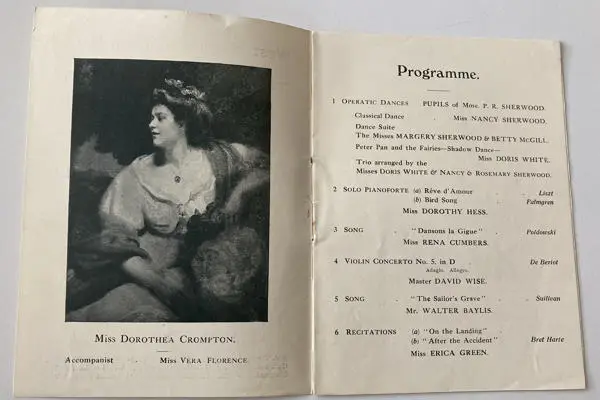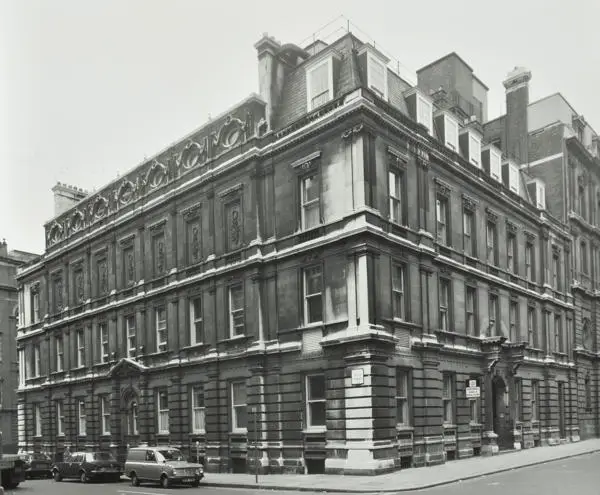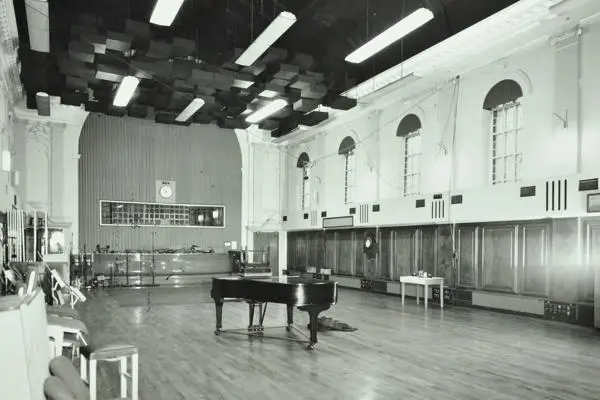Dorothea Crompton
Focus on Women: Dorothea Crompton
LMA holds a collection of papers (CLA/058/01-03) relating to the musician Dorothea Crompton (1878-1964) who was a pupil at Guildhall School of Music and a concert singer throughout the years 1901 to 1924. Records include concert programmes, advertising posters, professors’ reports and correspondence. In the records she is occasionally referred to as Dorothy. Charlotte Hopkins tells more about this 'very dainty and efficient singer…' (Globe Newspaper, 4 July 1916).

Who was Dorothea Crompton?
Dorothea Crompton spent her early years in Islington and was baptised at St Silas, Pentonville, on 3 October 1878 with the name Mary Dorothea Crompton to parents John and Mary Ellen. At the time the family were living with one domestic servant in a tall Victorian terrace property at 3 Hartham Road, Lower Holloway.
Her father, John Crompton, was an artist in oil painting and her mother, Mary, is noted as a school board mistress on the 1881 census. Following his retirement as Principal at Heatherley’s School of Art, Chelsea in 1907, Crompton was presented with a portrait of his daughter painted by the distinguished artist Frank Owen Salisbury who had been a pupil at the school. There is reference to this portrait at Manchester University Library Special Collections which hold the papers and sitters books of Salisbury. Dorothea is included within them and next to her signature she has written the date 'January 3 1908' which is likely to be the year of the painting’s completion.(I have not found a copy of this portrait at the time of writing.)
Guildhall School of Music & Drama
Crompton attended the Guildhall School of Music which was then located at John Carpenter Street in the City and designed by Sir Horace Jones. There were 45 studios with a grand and upright piano, and a practice room which also doubled up as a concert hall. She studied both voice (under Professor Hast) and piano (under Professor K Augusta Davies) from 1901.
Professor's reports from Davies give an insight into Crompton’s talent: "A very excellent pupil, with great musical feeling" and another has further praise: “A most satisfactory pupil, artistic, & hard-working, with a decided gift for accompanying.” A report by Professor Hast in 1908 considered her, “a fine classical singer”. She sang as a contralto which uses the lowest vocal range of the female voice.

Amongst the programmes (CLA/058/01/006) is a students' annual concert at the prize-giving ceremony with presentation of medals, prizes and certificates by the Lady Mayoress and Lord Mayor, Sir John Pound in the Guildhall on 28 October 1905. Crompton won the Ada Crossley Prize that year and sung at the concert the aria Have mercy upon me, O God from Bach’s St Matthew Passion.
Letters
Miss Ada Crossley (1871-1929) was an Australian singer who had been received with great success in London at the Queen’s Hall in 1895. The Guildhall School of Music prize had been dedicated in her name. In 1914 Crossley expresses an affection for Crompton in a letter in 1914 inviting her to tea at her house in Langford Place, St John’s Wood (CLA/058/02/023).
In 1908, Crompton wrote to Ebenezer Prout (1835-1909) who was a musical theorist, composer and teacher. A reply from him exists in the collection: “I was greatly pleased with the way in which you sang Bach’s songs last break, and, should I have an opportunity of recommending you, it will give me much pleasure to do so.” (CLA/058/02/015)
By 1910, Landon Ronald (1873-1938), the newly appointed Principal of the Guildhall School of Music, had spotted Crompton’s gift and provides testimony to it in a letter: “Nobody regrets more than I do that your light should have been hidden under a bushel for such a long time, but you may rely upon my doing everything I can to rectify such a grave mistake. I am glad that my few words which I spoke to you yesterday have encouraged you in your work, and please believe that I shall make a special point of following your career here with interest.” (CLA/058/02/019)
Performances beyond the Guildhall School of Music
Crompton performed at a number of prestigious venues across London including the Athenaeum, Aeolian Hall, Bechstein Hall and Steinway Hall. Bechstein Hall was opened in 1901 by the German piano firm and became Wigmore Hall in 1917. One such concert Crompton took part in 1919 at Wigmore Hall was entitled ‘Serious Songs and Songs in Costume’.

A sense of how Crompton sounded is outlined in a report in the Globe newspaper on 4 July 1916 following a recital at Steinway Hall:
'A very dainty and efficient singer is Miss Dorothea Crompton who chose a programme of old French and modern English songs for her recital at Steinway Hall yesterday afternoon. Her chief merits consisted in an unusually clear diction and a delicately subdued mezza-voce tone; and it is not surprising that with these assets she gave an excellent account of the French songs in her scheme. ‘Ma mie’ and ‘Voici Noel’ were delightfully sung, without exaggeration and with a subtle hint of the fragrance suggested alike by the words and melodies.'
Concerts for causes
Within a month of the tragedy, Crompton arranged a concert in aid of the Titanic Disaster Fund. This took place on 11 May 1912 at Hampstead Town Hall where she was also one of the performers with traditional songs such as ‘Come, Lasses and Lads’. (CLA/058/03/001)
Elsewhere, the Sunday concerts held at South Place in the City of London had started out at Conway Hall in 1878 with the aim of promoting good music at a low cost. One such performance at South Place on 24 January 1915 was a: Concert of Compositions by Women Composers – with Margaret Wild and Dorothea Crompton performing a duet called 'Maying' by Alice Mary Smith (CLA/058/01/036).
Prizes in memory of Dorothea
In later life Crompton was advertised as being available for 'At Homes' and lessons in voice production and singing at her address 102 Fellows Road, Hampstead where she lived for almost half of her life.
She died at University College Hospital, London on 2 December 1964 at the age of 86 leaving a substantial estate of £57,415 which speaks somewhat of how successful she was. Her memorial stone at West Hampstead Cemetery at the family plot can be seen on Flickr.
The Times reported on 26 February 1965 that, 'She left family and personal legacies, £500 to the Artist’s General Benevolent Fund and £250 to the Royal Academy of Arts Benefactors’ Fund.' In addition, two prizes were established at the Guildhall School of Music and Drama in her memory with the help of Margaret Louise Band who had shared a house with Crompton. The Music Committee in November 1971 informed the Common Council that a Miss Louisa Band had offered the sum of £450 to be awarded in memory of the former pupil Miss Dorothea Crompton. It was to be an annual prize for the singing of music by J S Bach. A second prize was established in 1974 for the sum of £495 to be awarded at the discretion of the Principal for Lieder or Chanson in alternate years or to be divided between the two subjects in any one year if the students’ performance warranted it.
Further Sources
LMA Collections Catalogue, reference CLA/058.
A cloak and dress ensemble designed by Liberty & Co c.1912-1918 which formerly belonged to Dorothea Crompton is held in the collections at the Museum of London. The garments were likely made especially for her and the theatrical feel with ruched sleeves and brocade cloak supplies a dramatic element perhaps suggestive of her character.
If anyone knows of recordings that might exist of her singing, then please contact LMA.